比较教育学重点
学前比较教育重点(复习)
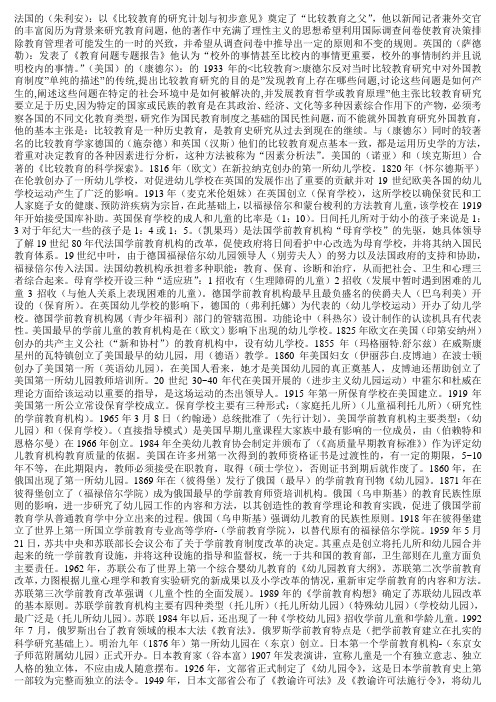
法国的(朱利安):以《比较教育的研究计划与初步意见》奠定了“比较教育之父”,他以新闻记者兼外交官的丰富阅历为背景来研究教育问题,他的著作中充满了理性主义的思想希望利用国际调查问卷使教育决策排除教育管理者可能发生的一时的兴致,并希望从调查问卷中推导出一定的原则和不变的规则。
英国的(萨德勒):发表了《教育问题专题报告》他认为“校外的事情甚至比校内的事情更重要,校外的事情制约并且说明校内的事情。
”(美国)的(康德尔):的1933年的<比较教育>:康德尔反对当时比较教育研究中对外国教育制度”单纯的描述”的传统,提出比较教育研究的目的是”发现教育上存在哪些问题,讨论这些问题是如何产生的,阐述这些问题在特定的社会环境中是如何被解决的,并发展教育哲学或教育原理”他主张比较教育研究要立足于历史,因为特定的国家或民族的教育是在其政治、经济、文化等多种因素综合作用下的产物,必须考察各国的不同文化教育类型,研究作为国民教育制度之基础的国民性问题,而不能就外国教育研究外国教育,他的基本主张是:比较教育是一种历史教育,是教育史研究从过去到现在的继续。
与(康德尔)同时的较著名的比较教育学家德国的(施奈德)和英国(汉斯)他们的比较教育观点基本一致,都是运用历史学的方法,着重对决定教育的各种因素进行分析,这种方法被称为“因素分析法”。
美国的(诺亚)和(埃克斯坦)合著的《比较教育的科学探索》。
1816年(欧文)在新拉纳克创办的第一所幼儿学校。
1820年(怀尔德斯平)在伦敦创办了一所幼儿学校,对促进幼儿学校在英国的发展作出了重要的贡献并对19世纪欧美各国的幼儿学校运动产生了广泛的影响。
1913年(麦克米伦姐妹)在英国创立(保育学校),这所学校以确保贫民和工人家庭子女的健康、预防浒疾病为宗旨,在此基础上,以福禄倍尔和蒙台梭利的方法教育儿童,该学校在1919年开始接受国库补助。
英国保育学校的成人和儿童的比率是(1:10)。
学前比较教育学重点复习资料
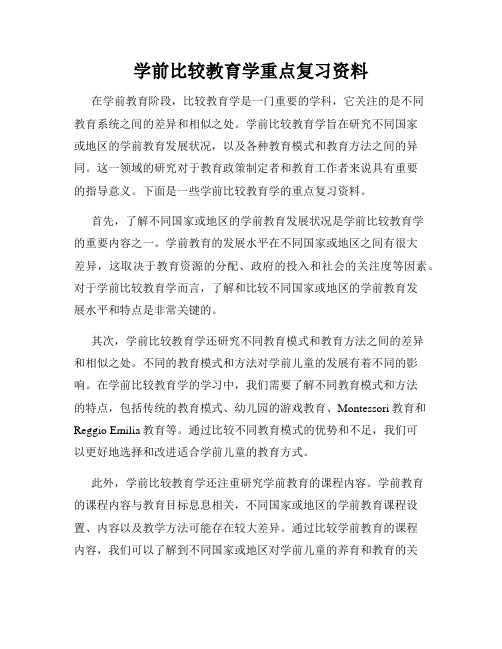
学前比较教育学重点复习资料在学前教育阶段,比较教育学是一门重要的学科,它关注的是不同教育系统之间的差异和相似之处。
学前比较教育学旨在研究不同国家或地区的学前教育发展状况,以及各种教育模式和教育方法之间的异同。
这一领域的研究对于教育政策制定者和教育工作者来说具有重要的指导意义。
下面是一些学前比较教育学的重点复习资料。
首先,了解不同国家或地区的学前教育发展状况是学前比较教育学的重要内容之一。
学前教育的发展水平在不同国家或地区之间有很大差异,这取决于教育资源的分配、政府的投入和社会的关注度等因素。
对于学前比较教育学而言,了解和比较不同国家或地区的学前教育发展水平和特点是非常关键的。
其次,学前比较教育学还研究不同教育模式和教育方法之间的差异和相似之处。
不同的教育模式和方法对学前儿童的发展有着不同的影响。
在学前比较教育学的学习中,我们需要了解不同教育模式和方法的特点,包括传统的教育模式、幼儿园的游戏教育、Montessori教育和Reggio Emilia教育等。
通过比较不同教育模式的优势和不足,我们可以更好地选择和改进适合学前儿童的教育方式。
此外,学前比较教育学还注重研究学前教育的课程内容。
学前教育的课程内容与教育目标息息相关,不同国家或地区的学前教育课程设置、内容以及教学方法可能存在较大差异。
通过比较学前教育的课程内容,我们可以了解到不同国家或地区对学前儿童的养育和教育的关注点和培养目标。
同时,也可以借鉴其他国家或地区的教育理念和经验,以提升学前教育的质量。
最后,学前比较教育学还需要掌握相关的研究方法和技巧。
学前比较教育学是一门涉及多学科交叉的学科,需要运用统计分析、实地调研、文献研究等方法进行研究。
在复习学前比较教育学的重点内容时,我们需要理解并掌握这些研究方法和技巧,以便能够进行准确、科学的比较研究。
总之,学前比较教育学是一门涉及多个方面的学科,我们需要了解不同国家或地区的学前教育发展状况,比较不同教育模式和方法之间的差异和相似之处,学习学前教育的课程内容以及掌握相关的研究方法和技巧。
比较教育学复习资料
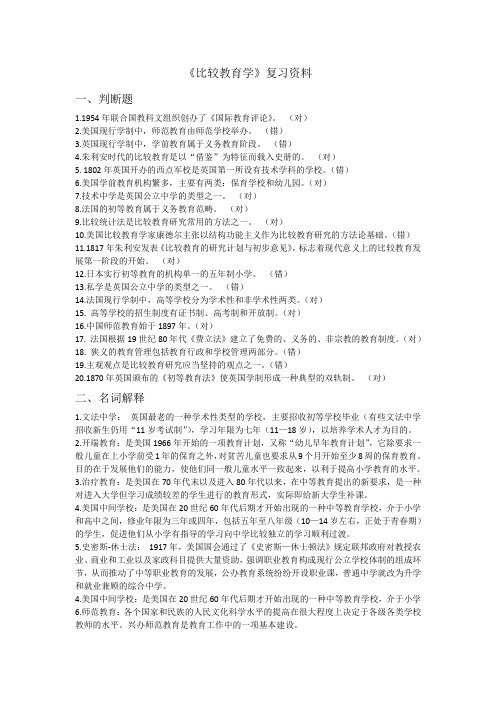
《比较教育学》复习资料一、判断题1.1954年联合国教科文组织创办了《国际教育评论》。
(对)2.美国现行学制中,师范教育由师范学校举办。
(错)3.英国现行学制中,学前教育属于义务教育阶段。
(错)4.朱利安时代的比较教育是以“借鉴”为特征而载入史册的。
(对)5. 1802年英国开办的西点军校是英国第一所设有技术学科的学校。
(错)6.美国学前教育机构繁多,主要有两类:保育学校和幼儿园。
(对)7.技术中学是英国公立中学的类型之一。
(对)8.法国的初等教育属于义务教育范畴。
(对)9.比较统计法是比较教育研究常用的方法之一。
(对)10.美国比较教育学家康德尔主张以结构功能主义作为比较教育研究的方法论基础。
(错)11.1817年朱利安发表《比较教育的研究计划与初步意见》,标志着现代意义上的比较教育发展第一阶段的开始。
(对)12.日本实行初等教育的机构单一的五年制小学。
(错)13.私学是英国公立中学的类型之一。
(错)14.法国现行学制中,高等学校分为学术性和非学术性两类。
(对)15. 高等学校的招生制度有证书制、高考制和开放制。
(对)16.中国师范教育始于1897年。
(对)17. 法国根据19世纪80年代《费立法》建立了免费的、义务的、非宗教的教育制度。
(对)18. 狭义的教育管理包括教育行政和学校管理两部分。
(错)19.主观观点是比较教育研究应当坚持的观点之一。
(错)20.1870年英国颁布的《初等教育法》使英国学制形成一种典型的双轨制。
(对)二、名词解释1.文法中学:英国最老的一种学术性类型的学校,主要招收初等学校毕业(有些文法中学招收新生仍用“11岁考试制”),学习年限为七年(11—18岁),以培养学术人才为目的。
2.开端教育:是美国1966年开始的一项教育计划,又称“幼儿早年教育计划”,它除要求一般儿童在上小学前受1年的保育之外,对贫苦儿童也要求从9个月开始至少8周的保育教育。
目的在于发展他们的能力,使他们同一般儿童水平一致起来,以利于提高小学教育的水平。
学前比较教育复习资料
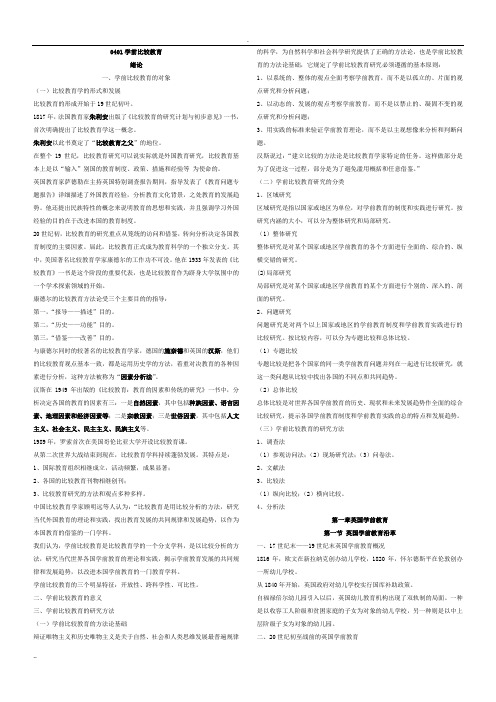
0401学前比较教育绪论一、学前比较教育的对象(一)比较教育学的形式和发展比较教育的形成开始于19世纪初叶。
1817年,法国教育家朱利安出版了《比较教育的研究计划与初步意见》一书,首次明确提出了比较教育学这一概念。
朱利安以此书奠定了“比较教育之父”的地位。
在整个19世纪,比较教育研究可以说实际就是外国教育研究,比较教育基本上是以“输入”别国的教育制度、政策、措施和经验等为使命的。
英国教育家萨德勒在主持英国特别调查报告期间,指导发表了《教育问题专题报告》详细描述了外国教育经验,分析教育文化背景,之处教育的发展趋势。
他还提出民族特性的概念来说明教育的思想和实践,并且强调学习外国经验的目的在于改进本国的教育制度。
20世纪初,比较教育的研究重点从笼统的访问和借鉴,转向分析决定各国教育制度的主要因素。
届此,比较教育正式成为教育科学的一个独立分支。
其中,美国著名比较教育学家康德尔的工作功不可没。
他在1933年发表的《比较教育》一书是这个阶段的重要代表,也是比较教育作为跻身大学氛围中的一个学术探索领域的开始。
康德尔的比较教育方法论受三个主要目的的指导:第一,“报导——描述”目的。
第二,“历史——功能”目的。
第三,“借鉴——改善”目的。
与康德尔同时的较著名的比较教育学家,德国的施奈德和英国的汉斯,他们的比较教育观点基本一致,都是运用历史学的方法,着重对决教育的各种因素进行分析,这种方法被称为“因素分析法”。
汉斯在1949年出版的《比较教育:教育的因素和传统的研究》一书中,分析决定各国的教育的因素有三:一是自然因素,其中包括种族因素、语言因素、地理因素和经济因素等;二是宗教因素;三是世俗因素,其中包括人文主义、社会主义、民主主义、民族主义等。
1989年,罗索首次在美国哥伦比亚大学开设比较教育课。
从第二次世界大战结束到现在,比较教育学科持续蓬勃发展。
其特点是:1、国际教育组织相继成立,活动频繁,成果显著;2、各国的比较教育刊物相继创刊;3、比较教育研究的方法和观点多种多样。
比较教育学

根据《1944年教育法》英国的继续教育的含义是为超过义务教育年龄的学生提供全日制教育,部分时间制教育教育和业余消遣活动,1992年明确了继续教育的范畴,,因此继续教育是义务教育结束后进行的除高等教育之外的所有教育。
14、社区学院
美国的两年制短期综合性高等教育机构。为本社区具备各种能力的中学毕业生及成人提供范围广泛的课程和服务,包括终结性计划,转学性计划,实行开放招生政策,但升级毕业有一定标准,学生一般走读,产生于20世纪初。这类学院的显著特点是:根据地方工商业发展的实际需要设置和调整教育计划,尤其是职业教育计划,收费低廉,适应大批少数民族学生和家庭收入较低的学生的需要,课程和教学时间形式对象灵活多样是美国普及高等教育的主要形式,使高等教育结构更趋于合理。
行政委员会是负责大学的日常管理工作,任命并培训教员并决定其工资,管理大学学院,学生宿舍,图书馆等,控制附属学院的认可并有权向评议会建议停止某学院与大学的附属关系。
学术委员会的主要职责是说明学成,确定课程,制定入学规程等,对大学的学术政策有权予以控制并起到协调系科的作用。
大学校长是一种名誉称号,同时兼任评议会主席一职。大学的实际领导是副校长,他必须保证《大学法》各条款和其他各种规则章程的贯彻执行,他有权召集评议会、行政委员会和学学术委员会会议并执行这些机构的各项决议。
美国于二十世纪八十年代提出的针对当时大多数美国人在科学上茫然无知、美国学生解决问题能力远逊于国际水平的状况,旨在普及美国中小学科学教育的长远计划,这项计划的重点是课程和教材,目前正在进行中。
二、论述
1、论述康德尔的主要比较教育观点并评价其贡献和局限
康德尔是美国著名的比较教育学家,1933年发表《比较教育》代表作
比较教育学知识点汇总
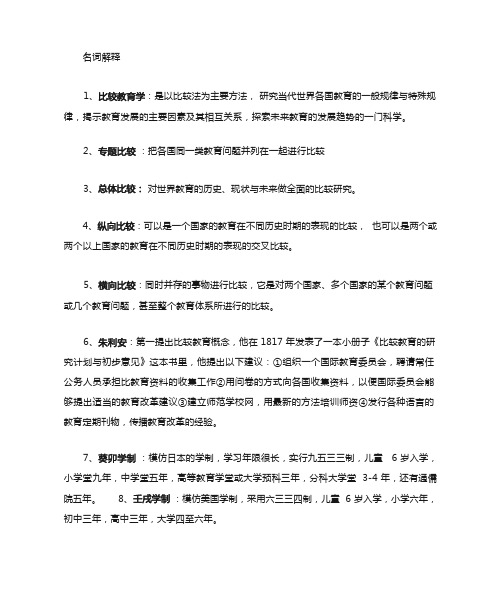
名词解释1研究当代世界各国教育的一般规律与特殊规律,揭示教育发展的主要因素及其相互关系,探索未来教育的发展趋势的一门科学。
2:把各国同一类教育问题并列在一起进行比较3对世界教育的历史、现状与未来做全面的比较研究。
4也可以是两个或两个以上国家的教育在不同历史时期的表现的交叉比较。
5或几个教育问题,甚至整个教育体系所进行的比较。
6 1817 年发表了一本小册子《比较教育的研究计划与初步意见》这本书里,他提出以下建议:①组织一个国际教育委员会,聘请常任公务人员承担比教育资料的收集工作②用问卷的方式向各国收集资料,以便国际委员会能够提出适当的教育改革建议③建立师范学校网,用最新的方法培训师资④发行各种语言的教育定期刊物,传播教育改革的经验。
7:模仿日本的学制,学习年限很长,实行九五三三制,儿童 6 岁入学,小学堂九年,中学堂五年,高等教育学堂或大学预科三年,分科大学堂 3-4 年,还有通儒院五年。
8:模仿美国学制,采用六三三四制,儿童 6 岁入学,小学六年,初中三年,高中三年,大学四至六年。
9 1806 年宣布建立帝“国大学”负责组织全国的教育,帝国大学只是一个行政机构,管理全国公里教育的学校和人员。
具体教学工具,则分别由小学,取代中心学校的市立中学,文、理、神、医、法学院负责。
10:是高级官员、高级管理人才和高级科技人才的主要培养基地,位于法国高等教育象牙塔的顶端,为中学的高材生所瞩目。
11:其一轨是为地主和资产阶级子女办的由预备学校或家庭教育、文科中学和大学组成的学术教育系统,另一轨是由国民学校与各种职业性教育机构组成的旨在训练平民子女成为守纪律、虔敬上帝和忠于统治阶级的臣民的学校系统。
12:是新型寄宿制私立文法学校。
公学最初曾收容一些平民子弟,但很快发展成为专门收上层子弟的贵族学校,其毕业生都升入牛津大学、剑桥大学深造。
1319 世纪初,英国国教会牧师贝尔和公谊会教徒兰开斯特分别发明了著名的导生制,使一名教师在导生的帮助下,同时可教数百名学生。
比较教育学复习资料

比较教育学复习资料一、名词解释1、“比较”的含义2、比较教育学的定义,性质和学科体系3、教育优先区96:指被政府列为物质或经济极为贫乏或不利,须优先予以改善,以利教育机会均等实现的地区。
为缩小不同社区之间存在的教育发展差距,法国政府于1981年制订了一项对处境不利社区的教育进行特别扶持的政策,即“教育优先区”政策。
教育优先区是依据学校的地理位置、社会环境、学生家长的社会职业状况,以及当地学前教育入学率、中小学留级率、外籍学生比例、中小学校网的密度等教育外部与内部的具体指标确定的。
对被确定为教育优先区的社区,国家采取特别的扶持政策,在经费、、师资、设备等方面给予支持。
4、双重训练体制:在职业学校中,为完成九年全日制义务教育的学生提供三年的职业义务教育,这种学校与企业紧密相连,形成双重训练体制。
接受这种教育的学生部分时间在企业接受实践训练,部分时间在职业学校接受基础文化知识与专业理论教育,毕业之后进入职业生活,或升入高一级的职业学校。
5、职业基础教育年134:这是一种职业教育形式,招收已完成普通义务教育的青少年,按职业领域划分对学生进行为期一年的基本技能与技巧方面的训练,为他们进一步的职业教育打好基础。
这种教育通常由全日制职业学校或通过企业训练与职业学校训练相结合的双重训练形式完成。
6、《天使计划》213:是日本政府于1994年出台的旨在推动幼儿教育改革的幼儿教育政策,《天使计划》提出全社会支援育儿的基本方针,国家、地方当局、企业、地区社会都要支持儿童养育,政府有关各省厅应制定今后十年支援育儿的政策与重点措施,有计划地推进,各方当局要根据当地特点制定相应计划于措施。
7、综合学习时间217:日本新的课程计划规定,从小学三年级起增加“综合学习时间”,它是与各科教学、道德和特别活动相并列的,是学校教育课程的一个有机组成部分,也是开展综合性学习的载体。
其学习的主要内容包括国际理解、信息、环境、社会福利、健康教育等。
《比较教育学》(完善版)
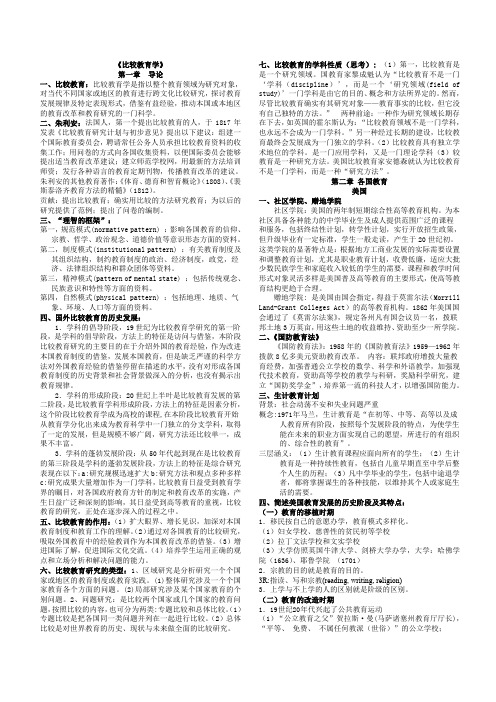
《比较教育学》第一章导论一、比较教育:比较教育学是指以整个教育领域为研究对象,对当代不同国家或地区的教育进行跨文化比较研究,探讨教育发展规律及特定表现形式,借鉴有益经验,推动本国或本地区的教育改革和教育研究的一门科学。
二、朱利安:法国人,第一个提出比较教育的人,于1817年发表《比较教育研究计划与初步意见》提出以下建议:组建一个国际教育委员会,聘请常任公务人员承担比较教育资料的收集工作;用问卷的方式向各国收集资料,以便国际委员会能够提出适当教育改革建议;建立师范学校网,用最新的方法培训师资;发行各种语言的教育定期刊物,传播教育改革的建议。
朱利安的其他教育著作:《体育、德育和智育概论》(1808)、《裴斯泰洛齐教育方法的精髓》(1812)。
贡献:提出比较教育;确实用比较的方法研究教育;为以后的研究提供了范例;提出了问卷的编制。
三、“理智的框架”:第一,规范模式(normative pattern) :影响各国教育的信仰、宗教、哲学、政治观念、道德价值等意识形态方面的资料。
第二,制度模式(institutional pattern) :有关教育制度及其组织结构,制约教育制度的政治、经济制度,政党,经济、法律组织结构和群众团体等资料。
第三,精神模式(pattern of mental state) :包括传统观念、民族意识和特性等方面的资料。
第四,自然模式(physical pattern) :包括地理、地质、气象、环境、人口等方面的资料。
四、国外比较教育的历史发展:1.学科的倡导阶段,19世纪为比较教育学研究的第一阶段,是学科的倡导阶段,方法上的特征是访问与借鉴,本阶段比较教育研究的主要目的在于介绍外国的教育经验,作为改进本国教育制度的借鉴,发展本国教育,但是缺乏严谨的科学方法对外国教育经验的借鉴停留在描述的水平,没有对形成各国教育制度的历史背景和社会背景做深入的分析,也没有揭示出教育规律。
2.学科的形成阶段:20世纪上半叶是比较教育发展的第二阶段,是比较教育学科形成阶段,方法上的特征是因素分析,这个阶段比较教育学成为高校的课程,在本阶段比较教育开始从教育学分化出来成为教育科学中一门独立的分支学科,取得了一定的发展,但是规模不够广阔,研究方法还比较单一,成果不丰富。
- 1、下载文档前请自行甄别文档内容的完整性,平台不提供额外的编辑、内容补充、找答案等附加服务。
- 2、"仅部分预览"的文档,不可在线预览部分如存在完整性等问题,可反馈申请退款(可完整预览的文档不适用该条件!)。
- 3、如文档侵犯您的权益,请联系客服反馈,我们会尽快为您处理(人工客服工作时间:9:00-18:30)。
Chapter 5 Globalization and Implications for Education1.What is Globalization?A.General Introduction of GlobalizationGlobalization, according to Toss-Hoist, has become the central issue of our time, and will define the world our children inherit. Globalization results in the increasing interdependence and integration of countries as the result of the worldwide movement of ideas, capital, labor and goods, and is a set of processes that tend to de-territorialize important economic, social, and cultural practices from their traditional boundaries in nation-states.Globalization is a process of interaction and integration among the people,companies and governments of different nations.Globalization‟s combined effect on economy, information technologies, and immigration results in cultural transformation and the transference of diverse values within and between societies.B.Multiple Conceptions of GlobalizationThese conceptions of globalization include economic, informational and communication technology-related, sociocultural, and philosophical/ethical dimensions.The Economic Globalization: worldwide marketization and economic growtha)For those who depict economic interdependence in positive terms,globalization represents a natural and inevitable expansion of themarketplace beyond national borders. Proponents of economic globalizationbelieves that society‟s wants and needs become more unified around theworld, and the cultures of production and consumption are articulated andfostered in common terms around the world. It is optimistic about the natureof interdependence. Market forces are best left to take their course withoutintrusion by the states and their governments except to the extent that theyprepare for changes that the market makes inevitable.b)People have the power—and perhaps the responsibility as “humanagent”—to shape markets and economic imperatives. This outlookacknowledges the economic nature of globalization, linking it with thepolitical by stressing the authoritative ways in which the most desirableproducts and productive roles are allocated to some but withheld from others.c)Economic globalization has resulted in economic inequality not only withinbut also across nations. It emphasizes the lack of symmetry in which theworld‟s people are able to participate.d)Economic globalization and education: Schools have an effect on the natureand depth of globalization‟s influences just as the imperatives ofglobalization themselves influence the schools.The Political Globalizationa)Political globalization is evident in the growing importance of internationalorganization. These organizations are transnational and enable states to takeconcerted action without sacrificing national sovereignty. (WTO, WB, UN)b)What globalization has changed is not the historical reality that politicalpower is often marshaled on the world‟s stage but that the effects andconsequences of this have become more sweeping.The Cultural Globalizationa)Cultural globalization is the process where information, commodities andimages produced in one part of the world enter into a global flow that'flattens out' cultural differences. (Confucius Institute)b)What globalization has changed is not the historical reality that politicalpower is often marshaled on the world‟s stage but that the effects andconsequences of this have become more sweeping.Information and Communications Technologies: the Rate and Reach of knowledge access space, time, and peoplesa)Global economy is often conceived as a “knowledge economy”, that is, aneconomy “driven by information and communications technology, and theturning of certain kinds of knowledge into economic wealth.b)According to According to Castells (1996), information and communicationstechnologies have transformed the rate and consequences of globalization notonly by collapsing the geographical distance that has traditionally separatedpeoples but also by condensing the time that communication has entailed.Therefore, an important implication of globalization on the contemporaryboom of communications and information is that there are opportunities forlearners to utilize and new realities for teachers to recognize.c)Constraint: How the amount of information now available as a result oftechnological progress actually lends itself to the development of knowledge?Technology revolution does not ensure students‟movement in developinghigh-order thinking such as analytical skills to gather information.d)Constraint: A fascination with assembled information alone can serve todistract technology‟s users from other constructive considerations about theconsequence of globalization.e)The homogenizing potential of information and communicationstechnologies, combined with the unequal distribution of technologicalresources, makes it likely that global society develops predominantly in theimage of the privileged developed world.f)Upon Education: Students need to make technology and its effects objects ofinquiry to ask questions about the computer rather than merely gettinganswers from it.Globalization as Sociocultural Phenomena: the movement of populations and the mingling of cultures and identitiesa)To a significant degree, sociocultural aspects of globalization provide acountervailing view towards the pressures of worldwide homogenization,calling attention to the ways that cultural variety is maintained and thathomogenization—at least in part—may be resisted.b)Local practice converts the borrowed to something unique. While schoolsworldwide may take a relatively homogeneous or isomorphic form andeducational practice often reflects European antecedents, importededucational practices are often creolized and indigenized.c)Immigrant people are especially attentive to the maintenance of their culturalpractices. Globalization for vastly larger numbers of people meansmaintaining familiar cultural habits and outlooks even as they must seek tounderstand and accommodate cultural norms and practices that are new.Although pressure to adapt and conform is a part of the complex process ofnegotiating the familiar and alien, immigrants can affect change andinnovation within their adopted environments.d)Educators should understand the divergence and convergence of perspectiveswithin classrooms that are increasingly multicultural. Ask how the nationaland international are reflected in the local and by the actualities andexperiences of people‟s lives.Philosophical Reassessmenta)Economic and social interdependence requires new mind-sets about thenature of and the meaning of citizenship, calling for a redefinition of “society”in terms of fellowship rather than in terms of primarily of kinship,community, and region.b)An ethically sensitive view of globalization demands realization that theburgeoning growth of information and communications technologies mayproduce a worldwide “digital divide,” preventing equal participation in theglobal conversation that technology may now make possible. Where basicc)The philosophical and ethical conception of globalization pro- motes anexpanded notion of literacy for effective participation as world citizens--aform of literacy built largely on global social justice. By this argument, thenotion of citizenship in the world demands the simultaneous universalizationof human rights.d)Upon Education: the world and for teachers to encourage in their studentssensitivity to social justice as it plays out on a much larger world stage. Fromthis perspective, functional literacy extends well beyond the realm of narrow“basic skills”(reading, writing, and math)—skills that are necessary but notsufficient in today‟s world. It places new obligations on teachers and studentsto expand and redefine their classroom goals. Schools may be a prime venuefor the transmission of ideologies favoring globalization, but such ideologiesare commonly defined in economic terms, and this regularly results in thediscrediting or removal of certain instructional emphases inschools—especially of knowledge that may distract attention from or callinto question the certainty and the propriety of a market-centric conception ofglobalization.C.Implications for EducationBecause of the intensified movement of peoples worldwide, educators, much like the students they teach, are obliged to navigate a complex terrain of language, race, ethnicity and gender.Educators are skeptical of the way in which a host of transnational participants have positioned themselves with explicit voice and power in the arena of education. The result, then, is that education is being redefined by powerful actors and that educators‟voices are more marginalized in policymaking arena. Thus, globalization is arguably not a neutral force or one that all people see as desirable. Martin Carnoy:a)The changes in labor markets and education systems due to the emergingdemand for workforces are capable of the production of high value-addedconsumer goods.b)The ensuing demand for additional resources for education in a policyenvironment is hostile to the expansion of the role of the public sector.c)The consequences of increased decentralization and privatization,which areoften considered as the most effective strategy forensuring quality andflexibility in a globalized economy.d)The multiplication of cross-national measurements of educationsystems.e)The widespread adoption of information technology to extend educationalopportunities to new target groups, and to improve educational qualitythrough computer-supported instruction and access to the Internet.f)This, by the way, can become a new area of globalization. One may wonderwhat the consequences are for university programs in the South of themultiplication of educational and training opportunities which exist on theInternet and which are developed by Universities in a number ofindustrialized countries.g)The transformation of culture and the resulting …struggle over the meaningand value of knowledge.2.Globalization as Paradox Rather Than ParadigmA.Viewing Globalization as ParadigmThe acceptance of globalization as an explanation for transnational circumstances reveals that globalization not only is the preferred terminology to identify societal development but has also been used to galvanize people‟s prereflective assumptions regarding societal development in the present era.Globalization, as a development model, has been elevated to paradigm status; that is, globalization has become the conceptual framework by which a host of stakeholders have come to organize their ideas about business, workplace competencies, and comparative advantage in an increasingly international context.Globalization, therefore, is understood largely as the next stage of development and progress for societies in the contemporary, postmodern age.B.Globalization as ParadoxThose critical of globalization, however, have raised arguments that globalization is more a paradox than a paradigm. Rather than serving as a typical example or paradigm of how the world evolves and operates, globalization seems to contradict itself in paradoxical ways.In this way, globalization can be examined in terms of its paradoxical nature--as a phenomenon that is contradictory to conventional wisdom and as conflicting with common opinion about it.While political and cultural borders arguably are becoming more fluid, nationalism and cultural impetuses are arising as well.How will nations form unity amidst diversity? Adopting cultural change yet preserving social order inlight of cultural convergence is currently a predominant challenge for multicultural, democratic societies.Along with the economic and instant communication benefits that globalization affords, people also become increasingly aware of the social dilemmas that cross national borders. Globalization may reshape nation-state politics and bring greater awareness of how others are faring within and among countries. While it brings benefits, tensions and dilemmas are also obvious in globalization.3.The Local-Global DichotomyThe lack of attention by transnational actors to issues of social justice is the downside of globalization‟s optimism. The current globalization is a process that builds upon previous relations of social and economic asymmetry between peoples and nations.For those in developing countries who seldom reap the benefits of globalization, tensions between the local and global are most apparent. The local-global dichotomy is evident even in some projects designed to promote democratic processes with educators and children in developing cational development efforts often imply new forms of imperialism, as educators from developed countries involve those from developing ones in “international”projects that do not necessarily build on the knowledge of indigenous com-munities, especially in postcolonial societies, but rather supplant participants' view s and experiences with “global”needs. Arguably, the “global” is actually the knowledge of those from developed nations passed off as priorities onto the other—the developing nation.Because globalization interrupts the ways individuals experience cultural belongings and national identities, a paradox of globalization is how difference itself has become a norm.The preservation of resident wisdom, especially in the face of imperialist forms of implanted and imported knowledge from western nations, is a way to maintain respect for and deference to indigenous knowledge or cultural ways of knowing. Two dominant characteristics of globalization are deterritorialization andreterritorialization.Thus, striking a balance between the local and the global is an important area for inquiry. The critical comparative educator must ask, What is globalization's end goal? Questions of cultural identity and national development are implicated in the processes of globalization because globalization's forces may actually incite strong reactions from local communities committed to protecting their particular views and values.4.Addressing the Local-Global DichotomyChildren, and their teachers, increasingly are challenged to examine ethnicity, race and language, gender, and class inequalities. Schools, therefore, are expected to help prepare students to adapt to a global-oriented economy while simultaneously negotiating community values at more local levels.The task for educators is to help children and youth develop skills that enable them to see themselves as global citizens as they engage in participation at local, national and international levels, national, and international levels. It is important to consider the degree to which educators themselves possess the skill of comparative perspective taking so that they might foster such competence in their students.According to Howard Gardner, institutions that are able to respond to globalization, while simultaneously respecting the diversities reflected in cultures and belief systems will be best positioned to navigate a global world.An important purpose of education in a global age will be helping students to address cultural pluralism.5.Globalization and Its Impact on Educational IssuesA.Globalization and Purposes of SchoolingWhat constitutes an “educated person”is often predicated onthe way in which dominant or powerful members of a society view the world. For those depicting the world through a globalization lens, contemporary society is portrayed as different from the past, with new realities and challenges presenting themselves to citizens who are increasingly being integrated into a global network ofrelationships that extend beyond their local communities. The forces of globalization demand certain sets of skills, values and morals.One assertion is to equip students with the kinds of knowledge and skills that will enable them to contribute significantly to their local communities and countries, because the world has entered a knowledge age.Centered primarily on economic mission—rational and scientific knowledge, economic-oriented values, etc.An important purpose of schooling, then, is to help students understand cultural, economic, political, and social convergence and divergence in a globalizing environment. These globalization tendencies are also explored in relation to educational access and opportunity.B.Globalization and Educational Access and OpportunityThe quality and consistency of educational experiences are unbalanced in globalization. For example, in Africa, economic hardship, compounded by disease, interferes with educational progress. The benefits of education are least available in the region that may be in most desperate need. children. HIV/AIDS introduces a situation in which low participation in education due to the disease begets an even higher incidence of that very disease, in turn further curtailing participation in school.As review of the discourse surrounding globalization has shown, the profusion of technology is linked to economic progress, for better or perhaps worse. On the one hand, the information and communications revolution requires new skills of students and opens new possibilities for access to information and the development of a richer knowledge of the world. On the other hand, however, the tendency for globalization's benefits to go disproportionately to wealthy countries surely extends to technological access.Globalization has brought significant relocation around the world, but migration is not available for all people in equal measures.Educators should agree that a more culturally diverse classroom gives all students access to richer learning environments. Teachers have a central role to play inpreventing the societal exclusion of students from new ethic groups that may be disparaged. They need to avoid reproducing inequalities. It is important for students to develop identities as residents and citizens of the world, and for teachers to assist them in developing these identities.Governments seeking to improve education see curriculum as a necessary tool.But teachers should be mindful of hierarchies that may emerge within the curriculum and that invocations of globalization can sometimes help to reinforce undesirable inequities and injustices. Teachers need to step into their roles as decision makers in the development and the execution of curricular policy, accepting their important functions as defenders of the curriculum.Reform towards citizenship: Help individuals see where they fit into the world, raise the awareness of global society, and their responsibility beyond borders;Cultivate students who recognize global inequities as moral affrontsC.Globalization and Education Accountability and AuthorityAccountability: Change may be articulated in ways that unfairly privilege some people at the expense of others. In order to prepare students who are responsive and capable of weighing the costs and benefits of globalization justly, today's schoolchildren need teachers who show them how to reconcile competing sets of values. These emerging tasks thrust new obligations on teachers. Yet the indeterminate work of producing global citizens is not among the tasks most often promoted as vital. Thus, there seems to be dissonance between the things for which teachers are accountable and those things for which they should be most accountable.Teachers' work worlds are shaped by increasing pressure to test students.Authority: Teachers will continue to be asked to develop the individual capacities of their students to compete in a widened global marketplace, which will press them to develop curricula for select students who will pursue "high-status"courses for skilled work. But because the global economy does not afford high-knowledge jobs for all interested and able citizens, "low-status" positions with little compensation will remain. Thus, it is important to question the degreeto which educators have authority, in light of accountability's momentum, to seek other important schooling aims, such as developing ethical persons committed to the creation of more socially just environments.D.Globalization and Teacher ProfessionalismProfessional educators inhabit a terrain situated between two spheres:Just as teachers comprise a bridge between the official and the unofficial spheres of educational policy and its implementation, they must also reconcile two major views: education for national economic growth and education for social transformation toward a more just society.Thus, it is necessarily appropriate that teachers be skeptical about working within a politics defined by the state's disciplining power [and]... capital, but not to be cynical.Three bear specific attention in light of globalization's potential influence on the unofficial sphere via the official one:a)Commitment to human dignity: The more specific form that citizenship takesin a global age is considerably more contested.b)Student in Critical discussion about social challenges: requires attention inschooling to globalization's benefits and challenges as well as a press towardenvisioning more equitable futures.c)Teacher reflection: Educators commit to examining why their practice takesits present form and how it might be improved. Here, too, globalizingimpetuses have tended to lessen the time necessary for such reflection and tocall into question the legitimacy of educators' critically reflective habits.6.Developing Teachers’ Comparative Perspective Taking SkillsWe argue that comparative perspective taking is an essential skill set for classroom teachers and their students. The comparative, cross-cultural exploration of educational issues is central to the field of comparative education--a field whose emphasis has shifted from an examination of foreign educational systems to the exploration of educational issues.Because globalizing impetuses increasingly impact schooling, the development of comparative perspective taking in educators and the students they teach must be given increased priority and attention. The educator's task, then, is not only to prepare students for contemporary society but also to help them envision and construct a world they deem desirable. The educative task is a necessarily complex one because a host of stakeholders, including policy makers, parents, and community members, influence the schooling context in which educators operate. Moreover, the milieu of economics, politics, cultural values, and national histories affect how societies view education and how education will help their respective societies realize their needs and goals in a global world.As a field, comparative and international education can help educators examine social needs and harness schools' potential to address those needs.The four issues addressed in this text--purposes of schooling, educational access and opportunity, education accountability and authority, and teacher professionalism--highlight the complications that occur as educators strive to teach students amidst a host of conflicting goals.Comparative perspective taking can help educators worldwide interpret the historical, political, and economic influences on education and their societies. We are confident that a comparative, cross-cultural, issues-oriented approach to teacher development can encourage critical thinking, aid educational decision making, and facilitate educational improvement. Without demonstrated concern for social justice worldwide--a benefit that comparative perspective taking affords--it is likely that individualism will motivate globalization and limit opportunities for increased participation on the part of oppressed peoples.7.ConclusionIt is our hope that by advancing the concept of comparative perspective taking we may encourage educators around the world to address social needs and educational challenges. Educators, therefore, must develop comparative perspective taking expertise and foster the same in their students.“Education's challenge will be to shape the cognitive skills, interpersonal sensibilities, and cultural sophistication of children and youth whose lives will be both engaged in local contexts and responsive to larger transnat ional processes”.This task is not an easy one, but its benefits will be worth the effort.问题提示:理论联系这里基本都可以找到。
